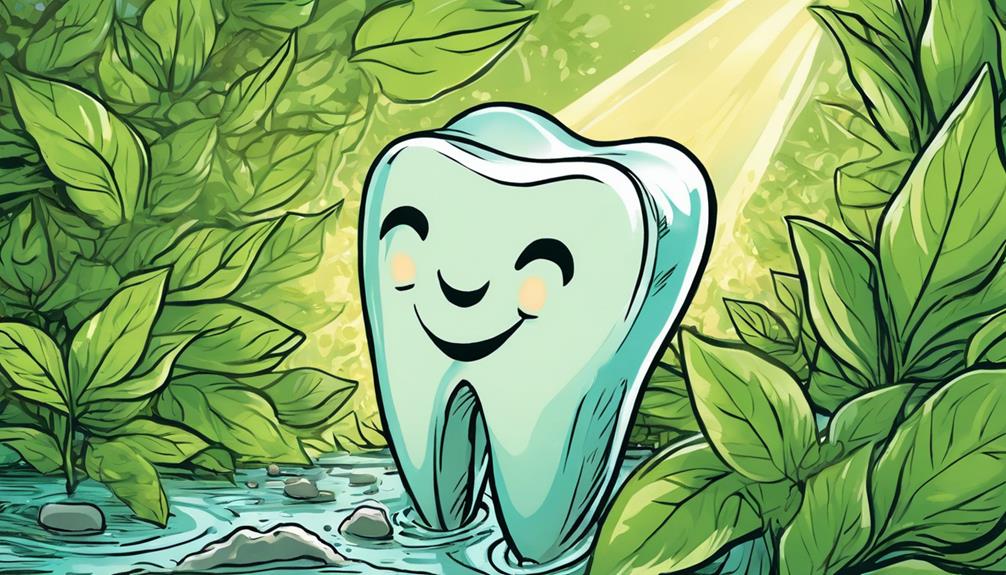Yes, you can reverse cavities naturally with the right oral care and dietary changes. Start by practicing good hygiene—brush twice daily with fluoride toothpaste and floss regularly to eliminate plaque. Cut back on sugar to reduce harmful bacteria and acid production in your mouth. Incorporate calcium-rich foods, such as dairy and leafy greens, to strengthen your enamel. You might also consider natural remedies like oil pulling to maintain oral health. By making these adjustments, you can promote remineralization and prevent further decay. Discovering more about these strategies could help you improve your dental health effectively.
Key Takeaways
- Reducing sugar intake diminishes acid production, helping to reverse early-stage cavities and promote a healthier oral environment.
- Incorporating calcium-rich foods, like dairy and leafy greens, strengthens enamel and supports natural remineralization.
- Oil pulling with coconut or sesame oil may reduce harmful bacteria, contributing to better oral health and cavity prevention.
- Regular dental check-ups and professional cleanings are essential for early cavity detection and personalized care.
The Nature of Tooth Decay

Tooth decay, commonly known as cavities, occurs when harmful bacteria in your mouth produce acid that erodes your tooth enamel, especially when fueled by sugary foods. These bacteria thrive on the sugars you consume, leading to a cycle of acid production that weakens your enamel over time.
As the enamel erodes, you might notice initial signs like white spots, indicating early demineralization. If you catch it early, there's a chance to reverse this process.
Understanding the nature of tooth decay is essential for prevention. When bacteria break down sugars, they generate acids that attack your enamel, which is the protective outer layer of your teeth. The more often you expose your mouth to sugar, the more opportunities bacteria have to create acid. In today's diet, refined sugars are prevalent, making it important to be aware of your intake.
Saliva plays an important role in combating tooth decay by providing minerals such as calcium and phosphate that help remineralize your enamel. By being mindful of your diet and oral habits, you can greatly reduce your risk of developing cavities and keep your teeth healthy.
Essential Oral Hygiene Practices

To keep cavities at bay, you need to establish a solid oral hygiene routine.
Brushing your teeth daily, flossing regularly, and using an antibacterial mouthwash can make a significant difference in your dental health.
Let's break down these essential practices and how they contribute to a cavity-free smile.
Daily Brushing Routine
Brushing your teeth at least twice daily with fluoride toothpaste is crucial for effectively removing plaque and preventing cavities. Your daily brushing routine should focus on using a gentle technique, making certain to cover all surfaces of your teeth. This approach helps avoid enamel damage while promoting good oral hygiene.
Start at the back of your mouth and move forward, systematically brushing each quadrant to guarantee no areas are missed. Don't forget to replace your toothbrush every three months or sooner if the bristles become frayed; this maintains ideal cleaning efficiency.
If you have children, supervise them while brushing. Encourage them to use a pea-sized amount of fluoride toothpaste and help them develop good oral hygiene habits right from the start. This guarantees they understand the importance of maintaining their teeth.
Ultimately, a consistent daily brushing routine paired with fluoride toothpaste is your best defense against cavities. By incorporating these practices, you can greatly enhance your oral health and reduce the risk of dental issues in the future.
Importance of Flossing
Flossing daily is essential for removing plaque and food particles from between your teeth, where your toothbrush can't reach, thereby helping to prevent cavities. Incorporating flossing into your daily routine can greatly enhance your oral health.
Here are three key benefits of flossing:
- Reduces Cavities: Regular flossing can reduce your risk of cavities by up to 40%. By removing debris that a toothbrush misses, you're actively protecting your teeth from decay.
- Prevents Gum Disease: Flossing not only cleans between your teeth but also helps prevent gum disease. Stimulating your gums through flossing promotes blood circulation, ensuring your gums stay healthy.
- Maintains Ideal Oral Health: The American Dental Association recommends flossing at least once a day. This simple yet effective practice prevents plaque buildup and preserves your overall oral health.
To maximize the benefits, use a proper flossing technique by gently sliding the floss between your teeth in a C-shape. This approach effectively removes debris without damaging your gum tissue.
Prioritize flossing in your daily routine, and you'll take a considerable step toward preventing cavities and maintaining excellent oral health.
Antibacterial Mouthwash Use
Incorporating an antibacterial mouthwash into your daily oral hygiene routine can greatly enhance your ability to prevent cavities and maintain a healthy mouth. These mouthwashes often contain antibacterial properties that markedly reduce harmful bacteria, essential for cavity prevention. Additionally, fluoride mouth rinses promote remineralization of enamel, helping to reverse early tooth decay.
Regular use of mouthwash, especially after meals, neutralizes acids produced by bacteria and washes away food particles. This practice helps combat plaque buildup, a major contributor to tooth decay.
Here's a quick comparison of mouthwash types:
| Mouthwash Type | Benefits |
|---|---|
| Antibacterial | Reduces harmful bacteria |
| Fluoride | Enhances enamel remineralization |
| Chlorhexidine | Effective against plaque and gingivitis |
| Alcohol-free | Gentle on oral tissues, less irritation |
Nutritional Adjustments for Healing

To reverse cavities naturally, you need to focus on nutritional adjustments.
Cutting back on sugar can help reduce harmful bacteria in your mouth, while incorporating calcium-rich foods strengthens your teeth.
Calcium-Rich Foods
Calcium-rich foods play an essential role in strengthening your tooth enamel and supporting the healing of early-stage cavities. By incorporating these foods into your diet, you can enhance your dental health and help your body repair any demineralized areas in your teeth.
Here are three excellent sources of calcium to take into account:
- Dairy Products: Milk, yogurt, and cheese are packed with calcium and help promote strong tooth enamel. They're also delicious and versatile in meals.
- Leafy Greens: Vegetables like kale and collards aren't only rich in calcium but also provide essential nutrients for overall health. Add them to salads or smoothies for a nutritious boost.
- Fortified Foods: Certain plant-based milks and cereals are fortified with calcium, making them great options for those who don't consume dairy. Check labels to verify you're getting enough.
Aim for a daily intake of around 1,000 mg of calcium to optimize your dental health. By making these nutritional adjustments, you support not just your teeth but also your overall bone strength and density.
Embrace these calcium-rich foods for a healthier smile!
Limiting Sugar Intake
Limiting sugar intake is vital for reversing early tooth decay and maintaining a healthy mouth. High sugar consumption leads to increased acid production by bacteria, which directly contributes to cavity formation. By reducing your sugar intake, you can greatly prevent tooth decay and promote cavity prevention.
Focus on cutting down added sugars, especially those found in sugary snacks and beverages. These items not only contribute to plaque buildup but also disrupt the balanced oral environment necessary for healthy teeth. Instead, prioritize whole foods that nourish your body and support your dental health. A diet low in refined sugars can enhance saliva production, which is fundamental as saliva contains minerals needed for enamel remineralization.
You'll also want to be mindful of hidden sugars in processed foods. Reading labels can help you make better choices. By making these dietary adjustments, you create a healthier mouth environment, reducing your risk of cavities and supporting your overall oral health.
Natural Remedies and Their Benefits

How can natural remedies enhance your oral health and help prevent cavities? By incorporating a few simple practices into your routine, you can support your teeth and gums effectively. Here are three powerful natural remedies to evaluate:
- Oil Pulling: Swishing coconut or sesame oil in your mouth for 10-20 minutes can reduce harmful bacteria and plaque buildup. This ancient practice helps keep your mouth clean, potentially preventing cavities.
- Calcium-Rich Foods: Eating foods high in calcium, like dairy products and leafy greens, is essential for remineralizing your enamel. Don't forget to pair these with vitamin D to optimize calcium absorption.
- Probiotics: Incorporating probiotic-rich foods such as yogurt, kimchi, and sauerkraut into your diet promotes a balanced oral microbiome. This balance can help reduce plaque and lower the risk of cavities.
Importance of Regular Dental Care

Regular dental care is essential for maintaining your oral health and preventing cavities effectively. By scheduling regular dental check-ups every six months, you allow your dentist to detect cavities early and treat them before they escalate into more severe problems.
During these visits, professional cleanings play an important role as they remove plaque and tartar buildup, which are significant contributors to cavity formation. Your dentist will also create a personalized care plan tailored to your specific needs.
This plan may include fluoride treatments and dietary guidance, both of which are crucial in enhancing the effectiveness of remineralization efforts. Routine dental assessments help you monitor tooth development and alignment, particularly important as permanent molars emerge during the ages of 11-14.
Understanding Cavity Reversal Potential

Many people don't realize that early-stage cavities can actually be reversed through a natural process called remineralization. This process utilizes minerals found in saliva, like calcium and phosphate, to strengthen your tooth enamel and reverse tooth decay.
To effectively support remineralization, consider these three key strategies:
- Maintain Excellent Oral Hygiene: Brush and floss regularly to remove plaque and food particles that can cause decay. Using fluoride toothpaste can enhance the remineralization process.
- Adopt a Balanced Diet: Focus on consuming foods rich in vitamins and minerals, especially calcium and phosphorus. Minimize sugar intake to reduce acid production from harmful bacteria that can worsen cavities.
- Explore Home Remedies: Some natural options, like oil pulling and using xylitol, may help create a balanced oral environment, promoting cavity reversal.
Frequently Asked Questions
Can You Reverse a Cavity Naturally?
Yes, you can reverse early cavities naturally by improving your oral hygiene, reducing sugar intake, and incorporating calcium-rich foods. Regular fluoride use and natural remedies can also support the remineralization process effectively. Additionally, teaching children proper oral hygiene habits from a young age can help prevent cavities from forming in the first place. This includes regular brushing and flossing, as well as regular dental check-ups. Natural remedies for kids’ cavities, such as xylitol and probiotics, can also be helpful in maintaining a healthy oral environment for children. Overall, a combination of good oral hygiene practices and natural remedies can help reverse and prevent early cavities in both children and adults.
Is It Possible for a Cavity to Repair Itself?
Yes, a cavity can repair itself, especially in its early stages. By maintaining good oral hygiene, consuming a balanced diet, and supporting saliva's mineral delivery, you can enhance the natural remineralization process and halt decay.
What Kills Cavities in Teeth?
To kill cavities, you need to focus on fluoride, which strengthens enamel, and maintain a balanced diet rich in probiotics. Regular brushing and oil pulling can also help reduce harmful bacteria and plaque in your mouth.
What Are the Chances of Reversing a Cavity?
You've got a good chance of reversing early-stage cavities, especially if you maintain proper oral hygiene, reduce sugar intake, and incorporate calcium and vitamin D into your diet. Consistent dental check-ups also boost your success rate.
Can Natural Remedies for Plaque also Help in Reversing Cavities?
Looking for natural plaque removal at home? While natural remedies can help reduce plaque buildup, reversing cavities may require professional intervention. However, regular oral hygiene and natural remedies like oil pulling and fluoride-free toothpaste can support overall dental health and potentially aid in cavity prevention.
Conclusion
In the journey to reverse cavities, think of your teeth as a garden.
With the right care—consistent brushing, nourishing foods, and natural remedies—you can cultivate a flourishing smile.
Just like plants need sunlight and water, your teeth thrive on attention and good habits.
While natural methods offer hope, regular check-ups are the rain that keeps your garden healthy.
Embrace this holistic approach, and watch your dental landscape bloom, proving that healing isn't just a dream, but a reality.









